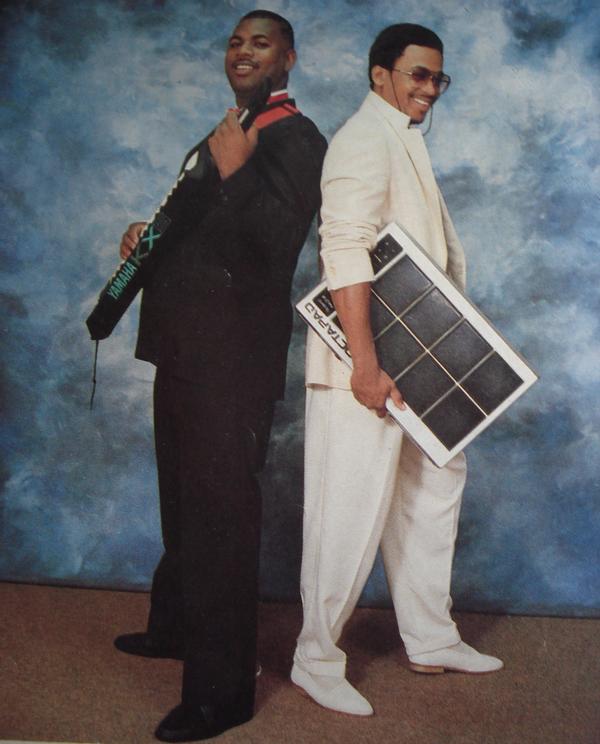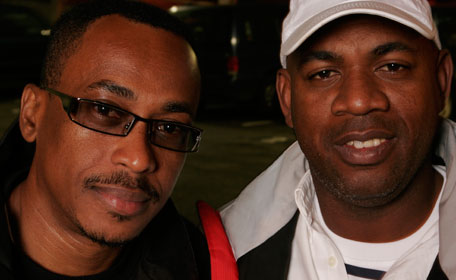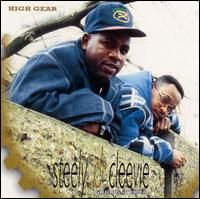Remembering Wycliffe “Steely” Johnson Aug. 18, 1962 – Sep. 1, 2009
Two The Hard Way: Steely & Clevie did it real big during dancehall’s digital era.
Even after reading the sobering words of his musical sparring partner Cleveland “Clevie” Browne in this Sunday’s Jamaica Observer, the untimely death of ace Roots Radics keyboardist and pioneering dancehall producer Wycliffe “Steely” Johnson still comes as a terrible shock. The 47-year-old musician, composer, and groovemaster has played such a vital role on so many classic reggae recordings—from Gregory Isaacs’ immortal “Night Nurse” to the ubiqitous Punany riddim to “Sorry” (by “the other Foxy Brown”) to dancehall blasters like Tiger’s “When” and Shabba Ranks’s “Ting a Ling” even soulful cuts like Beres Hammond’s “Double Trouble” and the hit remake of Dawn Penn’s “No No No”—that it’s hard to imagine Jamaican music without him. [UPDATE: V.P.’s new Reggae Anthology pays tribute to Steelie & Clevie]
The veteran producer had been suffering from complications of diabetes that affected his kidneys. “When I left him in New York he was bouncing back and recovering,” Clevie told the Observer’s Steven Jackson as his friend and production partener lay in critical condition in a New York hospital, “then he got pneumonia and it took him down. bad, bad, bad…”
At times like these all we can do is say a prayer for the man’s family and loved ones, and honor his legacy by returning again and again to the music he loved so well. From early sessions for Youth Promotions and the Black Ark to his groundbreaking work with the Roots Radics band to ushering in the digital era at King Jammy’$ to establishing Steely & Clevie Productions and later Studio 2000, here are just a few of Steely’s greatest hits. Let it go…
1. Hugh Mundell “Africa Must Be Free By 1983”
2. Gregory Isaacs “Night Nurse”
3. Dean Fraser & King Jammy’$ All-Stars “Punany Sax”
4. Foxy Brown “Sorry”
5. Shabba Ranks “Ting A Ling”
6. Tiger “When”
7. Beres Hammond “Double Trouble”
8. Dawn Penn “No, No, No”
9. Sean Paull & Mr. Vegas “Hot Gal Today”
10. Assassin “As A Man”
[audio:https://www.boomshots.com/tunes/AsAMan.mp3]From Michael Jackson to Walter Cronkite, 2009 has been a cruel year already. Add one more to the list of legends lost. For those who had the pleasure of meeting Steely, it’s hard to picture the bold, boisterous man we knew laying in a hospital bed. When thinking about Steely, we tend to think of drum machines rather than dialysis machines. I prefer to let my mind drift back ten years ago to a conversation I remember so well it seems like just yesterday.
It was a May afternoon in 1999, and the Street Sweper riddim was running Jamaica. I had just returned from Music Ambassador with a fresh batch of 45s which left no doubt that I needed to link the STUDIO 2000 CREW and ask them to speak on their big new Street Sweeper riddim. Clevie, the more soft-spoken half of the duo, answered the phone and explained that said big new riddim riddim was not new at all, but “put together about two years and two months ago.” Such was the painstaking creative process behind a new Steely & Clevie production—a far cry from the slapdash standards decried by critics of dancehall. “Over a period of time, like a year, a year and a half we started doing the vocals. bit by bit it came together and the riddim evolved to what it is today.” Which was, I pointed out with some enthusiasm, one of the hottest tracks in the dancehall.
Very quietly, almost reluctantly, Clevie agreed. “Yeah.”
Clevie and his late partner Steely played on three decades of reggae classics.
ROB KENNER: Who was the first artist to voice on the Street Sweeper?
CLEVIE: Cobra. It was Mad Cobra. Or Burro Banton… Cobra was the first.
Most of the songs came out at the same time.
That riddim has a unique structure. Not just anybody can ride it.
We, we, we… hand-pick the artists. Most of them they are specially selected.
What was the inspiration behind the track itself?
The whole idea came from Steely—on a street corner, actually. He was sitting there on a street corner, rocking a stone, and the groove that the stone was giving him… Sort of like what happened with [Dave Brubeck’s classic jazz record] “Take Five.” This guy I understand worked in a factory and the machines had the “Take Five” rhythm.
Is that right?
Yeah but the stone created the vibe. [laughs]
Was he sitting on the stone or what?
He was sitting on the street corner rocking it with his feet.
And the stone just spoke to him…
So I was down at the studio and he rushed in and said, “Hey Clevie! I have the wickedest riddim in the world.”
As I understand it, you are more the drums expert and he is more the bass man.
So I had to translate the stone now into drums. But over the period of time, from two years ago, we changed a lot of things. So you don’t hear the stone in it. [laughter]
It reminds me of the one-drop mix in some old-time dancehall session.
Steely just came in.
[Clevie passes the phone to Steely, whose booming voice replaces his quieter partner’s]STEELY: Hello….
I just was hearing the story of how you first got the vibe for the Street Sweeper.
What it was, I was by the studio, Arrows recording studio.
Where they do all the dubplates.
Looking out I see some artists, just to talk. We always sit there and talk. And I was standing there, just idling, rocking on this stone. You know those manholes in the road, sometimes they got some stone, like a stone covering the hole… well one got out of the hole and I was on it rocking and it gave me this beat: CLIK CLIK cli-cli-CLIK. Because I was from the old school you know, from Volcano days, from Roots Radics days, Gregory Isaacs, so I picked up on it immediately. So then the vibes came to me. And Wickerman came along. And I say Wicker, Hear this and DJ for me. And him say “Blow-wow!” From then I just go to the studio and find Clevie and Mikey and say Boom!
A riddim is born.
Well Clevie ah the man now weh I can tell him anything and he bring it out. That’s how we collaborate, right? But other than that, I think we were inspired too by even the artist dem. Cause they were complaining and saying them tired of the Boom-Boom-Boom and they needed changes. So me did wan’ give a lot of credit to most of me artists dem. Like every man pon it, from Scare Dem come down, Sean Paul… all the artists dem. Even you have some other man weh no even deh pon the riddim who ah me bredren dem, we work together on it. Is a whole vibes. Me waan give credit to dem man deh too, yaw hear me? I was the first, I was the forerunner, but we need them vibes as well—y’unnerstand.
So I understand that the riddim has been sitting there for over two years.
It no really sitting. It took us two years and two months to finish it—not sit down. Constant work. We don’t make it and put it down. We change the drums about 15 times, the bass about 100. We get the right orchestra sound like, um, the strings. So it’s not something you put down and it old. It took us two years. And then when each artist come in and do his part, we have to make him relate back to what is on tape—just in his own character of talk, he has a sound yunno. Like how Scare Dem have a sound. Sean Paul…. So the riddim haffi compatable to each individual. So it take a lot of work. So we haffi put back the phrases make it match each person and his vibes. So is not just a simple ting just come, is a hard work.
And most of that work is done before you even put voice to it?
Before. This is before. So while I’m adding on, when each person go in, I keep on adding. Maybe when Zebra dem come, we haffi go change the ’igh-hat. So we keep adding. Me can’t tell you, ah just some miracle. Miracle yunno.
But as I said before, I have the old school under my belt. It’s so easy for me because me and Clevie play in a band for years and live music. And then now, the whole concept is that I wanted to show the world that even in older days, the new DJ here can DJ as well pon anything come from dem times. But maybe they never get the opportunity of the right producer to show how or show the world say Yeah them can do it. That’s why I mix the flavor, I use the young youth dem of today, and the veteran dem
Not many producers will put a Burro Banton on the same track as a Sean Paul or a Scare Dem Crew.
Yeah because Scare Dem is as good as Burro, and Burro is as good—maybe it’s not his time. But in his time… yunno.
So people have been downgrading the newer artists, you think?
No I don’t think them downgrade them because them never get a chance to show. So a man just take it… Me never go so far, I just think seh the public in general might say “Ooh, Daddy Roy” But the world never hear Scare Dem pon a Daddy Roy venture. But we make a man say No! Music a music. DJ a DJ. Singer a singer. They can do anything. But it’s harder for the old DJ dem to come within the young youth style. But the young youth dem can go inna them man’s style.
And they all can touch down on the Street Sweeper.
Ahhhh—and show them versatility on the Street Sweeper.
To me that sound is almost like an old rub-a-dub mixdown.
No is not really that. What it is—y’unnerstan… You see dance, when a person dance, them dance have a certain tempo and certain mood, certain beat—why? The body talk yunno. The body talk through music. Is like you have to be a visionary—a man who can vision ting, get me? And you haffi can premeditate it further down the road before you even reach to it and see what it’s gonna be like. What it ah go sound like. How it ah go feel. That’s why it took us so long, because we haffi run the program first and then transform it back. Y’unnerstan’? Like down the road how it gonna sound like, what it gonna feel like. So it’s a whole heap a work put in inna it. It’s not something you say it mix like a rubadub. It nah nuttin’ like a sound system. It’s just from you start a certain way you have to end up a certain way.
So you see the vision from far.
From far. And even dem too, is the artists them weh did see it too. Caw when me did tell them ’bout it, dem did say Yeah. And them did brave enough still, becaw… Artist nah go risk them career still, but them did haffi brave. You can imagine a man like Scare Dem and Sean Paul dem go pon a one-drop riddim weh them never do yet. That’s going to be scary for them yunno. Don’t it?
Yeah. You brought out the lionheart in them.
I hail the lionheart inna dem, so them ah go prove it. Me have me sidekick named Screechy Joe, me have Polish, me have Wickerman. Pon the other side now, them are the man who sit down side and say “Change the snare.” We work. A whole heap of we work. We work. And we don’t lock music yunno. We open music. Caw if everybody around us is not happy and feel good, then we cannot complete it. It no right. So when everyone around us feel good we say, Yes, we ready. So what’s happening with Street Sweeper now, we already know that we should do that. Cause we talk ’bout it. That’s why we could sit down on this so long. And hear me—we did say we couldn’t too make the new millennium come catch we. The millennium bug. Y’unnerstan’…
No after you set the pace long time ago with the “Ting-A-Ling” and all of that.
We have a next thing, badder than the Street Sweeper you know. A new thing named “Bitter Blood.” Jee-sus. As a matter of fact, I’m here with Scare Dem trying to voice now. Elephant, come, talk to the man.
[STEELY PASSES THE PHONE TO ELEPHANT MAN]What’s up Elephant Man?
ELEPHANT MAN: Me deh ya chillin’ in the studio with the big man Steely and Clevie and Mikey the engineer and Screechy Joe the DJ over deh so an the whole family. Yeah, so you know say we ah come sick the world again with a sittin yah named “Bitter Blood.”
You come to Dun the Place again.
Yeah man, with a thing called “War War War.” Give it to them.
To me “Dun the Place” is one of the wickedest Scare Dem. Tough, tough tune.
Yeah man, that are the biggest Scare Dem right now king man. [sings] “Scare Dem style yah DUN THE PLACE.!” What else you coulda tell the world say right now? That’s how me style name “Dun the Place. “Siddown pon the riddim father. Yeah mon.
It’s all about the Street Sweeper yunno. Anybody miss it, miss supm in dem life. Come like you go pon a adventure now. You see as a little boy you waan go Coney Park and Disneyland. And you go, and you can show off for your friend dem and say, Me go deh so already, weh you ah do? So me can say, me did catch the Street Sweeper inna the millennium. You can’t come tell me bout big tune. True you never get no big tune over the years don’t talk to me bout the Street Sweeper. “Scare Dem style done the place!” So now me ah go deh inna the juggling for the years to come. Caw ah no just dat alone, the juggling that playing now, them riddim ah go be in the juggling for years to come.
When you work with Steely & Clevie you’re working with some dancehall legends.
Yeah, I waan big up me programmer yunno. The big engineer Mikey himself. Cause a dem youth deh, when Steely say “Hol’ on. Me waan some water. Gwan punch it in Mikey.” A him. Then him a take the big tune dem. You see me? Caw him say Elephant, dat key deh, come down likkle more with the key and Don’t go too high and ray ray. So we haffi just big up Mikey the engineer. Him ago be the next millenium engineer, seen? A Scare Dem engineer so you dun know.
All right, big up Mikey then.
Seen father, so you know much love yunno father. Seen sah?
Yes Elly.
Seen? So I make you talk back to the big man. Hold on…
[Elly hands the phone back to Steely]So, Steely, things a gwan.
STEELY: Yeah we ah work still yunno. Caw we come fi elevate up the music and move it forward yunno. Because we are the pacesetter from morning you know. Don’t nobody coulda come change it but we, but us. It haffi be we. Caw we set it, so it haffi be we who change it.
Where do you see the new style of dancehall going?
What I am seeing is that it open a lot of doors for people to explore their ideas and take a chance. Cause so many people close down and clamp down because them say them ‘fraid because it’s dancehall happening. So man ‘fraid to go on an adventure. Get me? Now it open the door that there’s a lot of one-drop making now. Cause a lot of singers coming out. A lot of sound coming back. The hype in the record shop start again. Everyone who’s involved as well. Even you playing a part. Even have a magazine and you’re writing a story. Everybody play a part—get me?
Excitement creating. Now let me get a few facts and figures straight. I first became aware of you when you were working with Jammy’s.
No man. I start before that man. I was with Roots Radics. A lot of them old songs you hear is I play them yunno. All them Barrington Levy, Johnny Osbourne “Don’t Want No Ice Cream Love,” Michael Prophet “Gunman,” Anthony Johnston “Every Day Is a Gunshot.” No we a play from 72, 73 now. Caw me and Clevie play two Bob Marley. We never give you a whole history of that, like how we play the “Night Nurse” and all them song deh. So it’s a whole history again.
So mek we just deal with the Street Sweeper now.
It has a DJ by the name of Screechy Joe. It has Capleton, Buju, Spragga, Shabba, um… “It Unfair” Zebra, it has… who is it again? Capleton. It has Anthony B. A whole lineup, a big lineup.
Which singers are on there?
Likkle John is on that one. The same bad songs dem man. Bad. See, I don’t come to run this though. Cause no one man can run this show. This show bigger than anyone. It’s like a circus. Y’unnerstan’? I just come to play my part, and play my part to the best of my ability. Right, that’s what Clevie and my focus is on. So we try to open the door for many people, even if a man has a competition with us, we even open the door for him and show him new ways. New roads, y’unnerstan’?
So you’re trying to enlighten the world with this one?
Yeah so every music can go better… And the old school is not dead.
You’re keeping it as strong as ever.
As strong as ever. Yeah. You have the word for it. Strong as ever.
What year did you establish Studio 2000?
’94. Yeah, I made that name because I knew from them, the year 2000 is near. So I went and got the first name for year 2000.
And the millennium is touching down any minute now. You feel you’re ready for it?
Long time. That’s why I started the Street Sweeper ahead of time.
And now it’s running the place.
Come like it just start. But hear wha now… I never wish for this to happen, is like a lot of producers go inside them shell now. Nobody want to come out. Nobody want to produce no new music. Everybody’s scared.
Oh, because the Street Sweeper is too wicked?
Yeah it so dominating. And you see the name it have? Heh-heh.
So it just swept everything out the door?
Man I tell you. Real riddim dat yunno.







nice interview – i’m going to forward to Clevie.
check my tribute:
http://www.yardedge.net/music/reflections-on-wycliffe-steely-johnson-of-steely-clevie
Thanks for sharing your excellent memoir. Considering all the work he has put in, a man like Steely can never receive enough tributes.
[…] (via Boomshots) […]
[…] If this is not enough for you, Boomshots has put together a strong retrospective of the duo’s work, including interviews and videos of some of their best known music. Check that out here: Better Days: Reasoning With Steely & Clevie (Boomshots.com). […]
[…] Boomshots like “Call The Hearse” and “Fire Pon a Weakheart” talks about how Steelie & Clevie first christened his Bushman—and why never used to love the name, until he checked the […]
As a producer of reggae/dancehall myself, I haffi give big big big respect & honor to Steely & Clevie for their great works in reaching true feeling in riddim. ya see me? So just tune in to TheRasDaveShow pon Randy’s Reggae Radio @ VPrecords and feel the vibes from the sound conquerors Steely & Clevie. http://www.mixcloud.com/RasDave S2,E10.
Xamount, rasdave